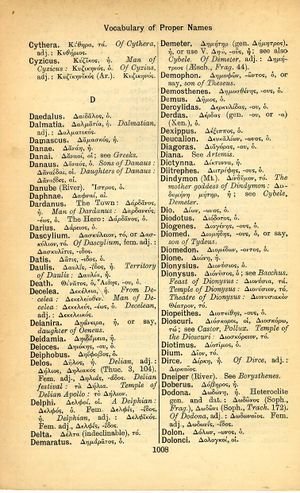Diagoras: Difference between revisions
From LSJ
Ὁ θάνατος οὐθὲν πρὸς ἡμᾶς, ἐπειδήπερ ὅταν μὲν ἡμεῖς ὦμεν, ὁ θάνατος οὐ πάρεστιν, ὅταν δὲ ὁ θάνατος παρῇ, τόθ' ἡμεῖς οὐκ ἐσμέν. → Death is nothing to us, since when we are, death has not come, and when death has come, we are not.
(D_3) |
(Gf-D_3) |
||
| Line 1: | Line 1: | ||
{{WoodhouseENELnames | {{WoodhouseENELnames | ||
|Text=[[File:woodhouse_1008.jpg|thumb|link= | |Text=[[File:woodhouse_1008.jpg|thumb | ||
|link={{filepath:woodhouse_1008.jpg}}]]Διαγόρας, -ου, ὁ. | |||
}} | }} | ||
{{Lewis | {{Lewis | ||
Revision as of 07:35, 14 August 2017
English > Greek (Woodhouse)
Διαγόρας, -ου, ὁ.
Latin > English (Lewis & Short)
Dĭăgŏras: ae, m., Διαγόρας.
I An atheistic philosopher and poet of Melos, a contemporary of Pindar, Cic. N. D. 1, 1; 1, 23; 42; 3, 37; Val. Max. 1, 2.—
II One of the most famous athletes in the Olympic games, a native of Rhodes, Cic. Tusc. 1, 46, 111; Gell. 3, 15, 3.
Latin > French (Gaffiot 2016)
Dĭăgŏrās, æ, m. (Διαγόρας),
1 philosophe de Mélos : Cic. Nat. 1, 2
2 Rhodien, qui mourut de joie en voyant ses deux fils couronnés le même jour à Olympie : Cic. Tusc. 1, 111
3 nom d’un médecin : Plin. 1, 12.

